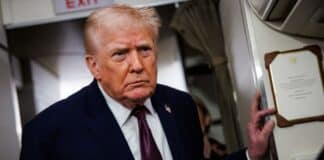House Republican lawmakers have called District Attorney Alvin Bragg to testify in front of the Select Subcommittee on the Weaponization of the Federal Government of the Committee on the Judiciary.
House Judiciary Chair Jim Jordan (R-OH) sent a letter to Bragg, writing that he is to appear before the committee on June 13.
“This hearing will examine actions by state and local prosecutors to engage politically motivated prosecutions of federal officials, in particular the recent political prosecution of President Donald Trump by the Manhattan District Attorney’s Office,” the letter reads.
Jordan similarly sent a letter to former Biden Justice Department official and Trump prosecutor Matthew Colangelo, also asking him to appear in front of the committee on June 13.
Colangelo was previously involved in “political consulting” for the Democratic National Committee.
After Trump was convicted on 34 counts of falsified business records in the hush money case, Bragg said, “I did my job.”
“Our job is to follow the facts and the law without fear of favor, and that’s exactly what we did here,” he stated. “What I feel is gratitude to work alongside phenomenal public servants who do that each and every day in matters that [the press] all writes about, and lots of matters that you don’t.”
“I did my job, we did our job,” Bragg emphasized. “Many voices out there – the only voice that matters is the voice of the jury, and the jury has spoken.”
Trump’s conviction came after Judge Juan Merchan told jurors that they did not have to unanimously agree on what criminal action Trump allegedly took. They only needed to agree that crimes were committed.
The unprecedented legal move has “plenty of grounds for appeal,” according to former U.S. attorney Brett Tolman.
“There are plenty of grounds for an appeal to reverse this case,” he told Fox News. “I’m not talking about gray areas — I’m talking about black-and-white violations by a judge and the evidence that he allowed in, and what he didn’t allow in, and then the jury instructions themselves.”





